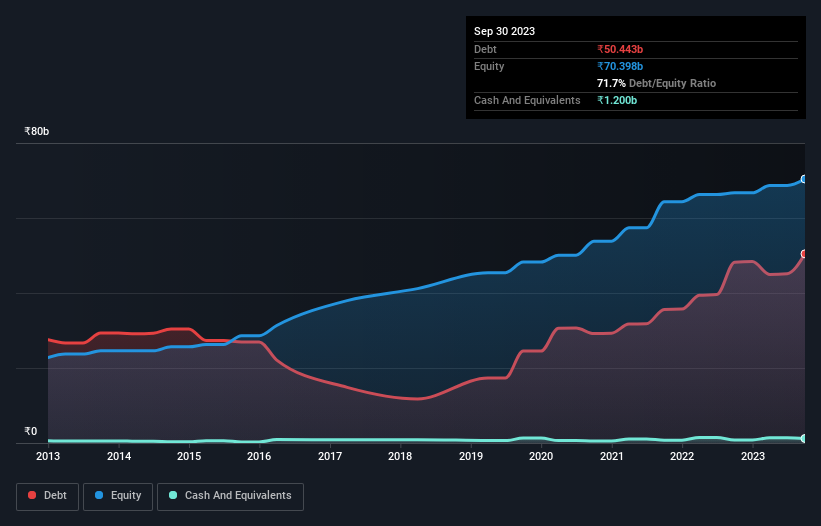Warren Buffett famously said, 'Volatility is far from synonymous with risk.' So it might be obvious that you need to consider debt, when you think about how risky any given stock is, because too much debt can sink a company. Importantly, The Ramco Cements Limited (NSE:RAMCOCEM) does carry debt. But is this debt a concern to shareholders?
Why Does Debt Bring Risk?
Debt assists a business until the business has trouble paying it off, either with new capital or with free cash flow. If things get really bad, the lenders can take control of the business. However, a more usual (but still expensive) situation is where a company must dilute shareholders at a cheap share price simply to get debt under control. Having said that, the most common situation is where a company manages its debt reasonably well - and to its own advantage. The first thing to do when considering how much debt a business uses is to look at its cash and debt together.
View our latest analysis for Ramco Cements
How Much Debt Does Ramco Cements Carry?
As you can see below, at the end of September 2023, Ramco Cements had ₹50.4b of debt, up from ₹48.2b a year ago. Click the image for more detail. On the flip side, it has ₹1.20b in cash leading to net debt of about ₹49.2b.

A Look At Ramco Cements' Liabilities
The latest balance sheet data shows that Ramco Cements had liabilities of ₹36.1b due within a year, and liabilities of ₹50.0b falling due after that. Offsetting this, it had ₹1.20b in cash and ₹4.98b in receivables that were due within 12 months. So its liabilities total ₹80.0b more than the combination of its cash and short-term receivables.
Ramco Cements has a market capitalization of ₹235.5b, so it could very likely raise cash to ameliorate its balance sheet, if the need arose. However, it is still worthwhile taking a close look at its ability to pay off debt.
We measure a company's debt load relative to its earnings power by looking at its net debt divided by its earnings before interest, tax, depreciation, and amortization (EBITDA) and by calculating how easily its earnings before interest and tax (EBIT) cover its interest expense (interest cover). Thus we consider debt relative to earnings both with and without depreciation and amortization expenses.
Ramco Cements has a debt to EBITDA ratio of 3.4 and its EBIT covered its interest expense 2.8 times. This suggests that while the debt levels are significant, we'd stop short of calling them problematic. The good news is that Ramco Cements grew its EBIT a smooth 47% over the last twelve months. Like a mother's loving embrace of a newborn that sort of growth builds resilience, putting the company in a stronger position to manage its debt. There's no doubt that we learn most about debt from the balance sheet. But ultimately the future profitability of the business will decide if Ramco Cements can strengthen its balance sheet over time. So if you're focused on the future you can check out this free report showing analyst profit forecasts.
Finally, a company can only pay off debt with cold hard cash, not accounting profits. So we clearly need to look at whether that EBIT is leading to corresponding free cash flow. Over the last three years, Ramco Cements saw substantial negative free cash flow, in total. While that may be a result of expenditure for growth, it does make the debt far more risky.
Our View
Neither Ramco Cements's ability to convert EBIT to free cash flow nor its interest cover gave us confidence in its ability to take on more debt. But the good news is it seems to be able to grow its EBIT with ease. When we consider all the factors discussed, it seems to us that Ramco Cements is taking some risks with its use of debt. While that debt can boost returns, we think the company has enough leverage now. There's no doubt that we learn most about debt from the balance sheet. But ultimately, every company can contain risks that exist outside of the balance sheet. To that end, you should be aware of the 1 warning sign we've spotted with Ramco Cements .
At the end of the day, it's often better to focus on companies that are free from net debt. You can access our special list of such companies (all with a track record of profit growth). It's free.
New: AI Stock Screener & Alerts
Our new AI Stock Screener scans the market every day to uncover opportunities.
• Dividend Powerhouses (3%+ Yield)
• Undervalued Small Caps with Insider Buying
• High growth Tech and AI Companies
Or build your own from over 50 metrics.
Have feedback on this article? Concerned about the content? Get in touch with us directly. Alternatively, email editorial-team (at) simplywallst.com.
This article by Simply Wall St is general in nature. We provide commentary based on historical data and analyst forecasts only using an unbiased methodology and our articles are not intended to be financial advice. It does not constitute a recommendation to buy or sell any stock, and does not take account of your objectives, or your financial situation. We aim to bring you long-term focused analysis driven by fundamental data. Note that our analysis may not factor in the latest price-sensitive company announcements or qualitative material. Simply Wall St has no position in any stocks mentioned.
About NSEI:RAMCOCEM
Ramco Cements
Manufactures and sells cement and construction Chemicals in India.
Reasonable growth potential with acceptable track record.
Similar Companies
Market Insights
Community Narratives



